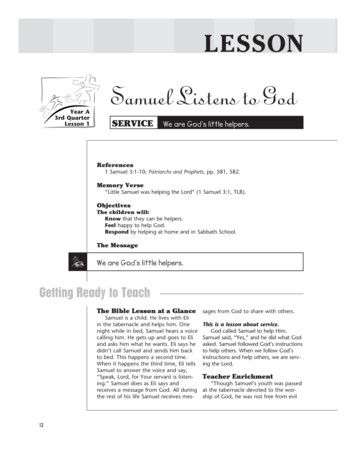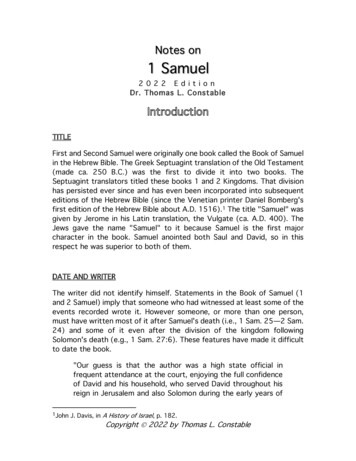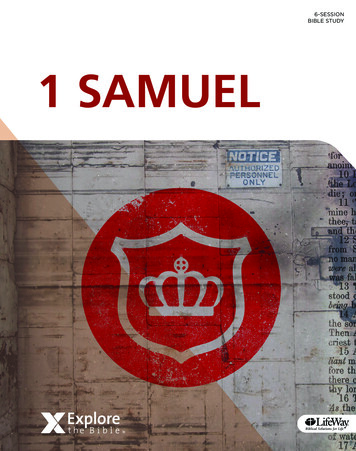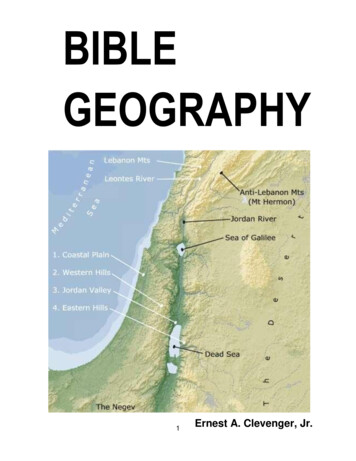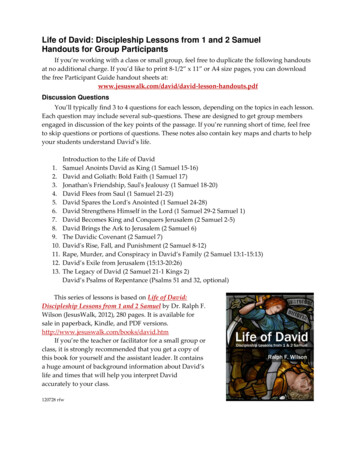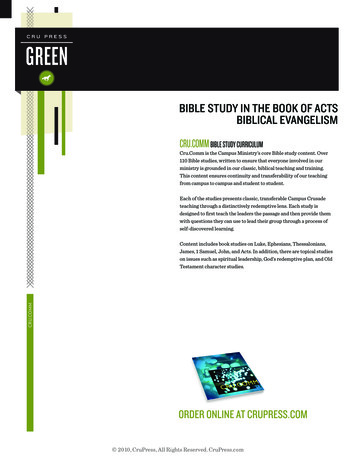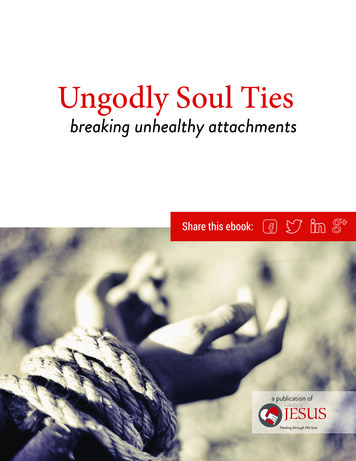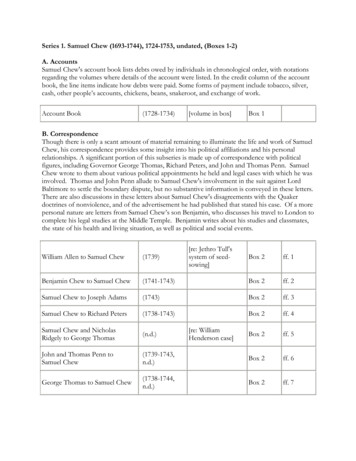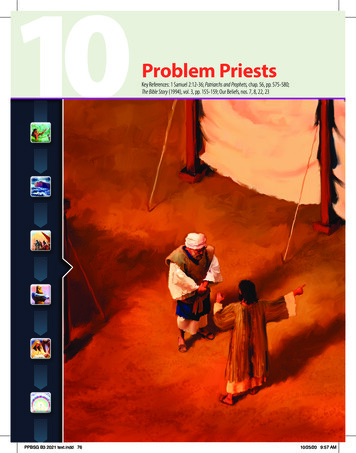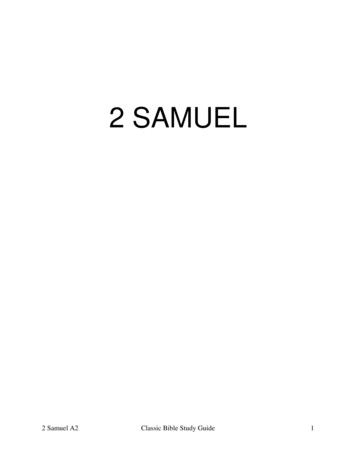
Transcription
2 SAMUEL2 Samuel A2Classic Bible Study Guide1
INTRODUCTIONSecond Samuel deals with the ascendance of David to the throne of Israel and the forty years of his reign. He is thefocal point of the book.The book begins with the death of Saul and Jonathan at the battlefield on Mount Gilboa. David is then anointed kingover Judah, his own tribe. There is a power play by the house of Saul in the persons of Ishbosheth, Saul's son, andAbner, Saul's commander in chief of the armies. Though this is resolved by the deaths of both, this summary statementdescribes the seven and one-half years before the nation is unified under David: “Now there was a long war between thehouse of Saul and the house of David. But David grew stronger and stronger, and the house of Saul grew weaker andweaker" (3:1).David unifies both the political and religious life of the nation by bringing the ark of the covenant from the house ofAbinadab, where it had rested since its return from the Philistines (6:1-7:1).The theme of the coming King, the Messiah, is introduced as God establishes an everlasting covenant with Davidand his kingdom, "Your throne shall be established forever” (7:16).David successfully defeats the enemies of Israel, and a time of stability and prosperity begins to emerge. Sadlyhowever, his vulnerability and weakness lead him into his sin with Bathsheba and his murder of Uriah, her husband.Though David repents after being confronted by the prophet Nathan, the consequences of his actions are spelledout: "The sword shall never depart from your house" (12:10).David's son Absalom, after a long estrangement from his father, instigates a rebellion against the king, and Davidflees from Jerusalem. The rebellion ends when Absalom, caught by his head in a tree, is killed by Joab.There is a quarrel between Israel and Judah concerning bringing the king back to Jerusalem. The rebel Shebarouses Israel to desert David and go back to their homes. Although David makes a series of unfortunate and unwisedecisions, the rebellion is quelled and David once again is established in Jerusalem.The book ends with two beautiful poems, a list of David's mighty men, and David's sin in numbering the fighting menof Israel. David repents, buys the threshing floor of Araunah, and presents offerings to the Lord on the altar he buildsthere.(Spirit Filled Life Bible’s Introduction to 2 Samuel, Jerry Cook)2 Samuel A2Classic Bible Study Guide2
2 Samuel 1:1-27"Now it came to pass after the death of Saul, when David was returned from the slaughter of the Amalekites, andDavid had abode two days in Ziklag" (2 Sam. 1:1). David had returned to Ziklag, where he was engaged with dividing thespoil he had captured and in sending presents to his friends (1 Sam. 30:26-31)."It came even to pass on the third day, that, behold, a man came out of the camp from Saul with his clothes rent andearth upon his head: and so it was, when he came to David, that he fell to the earth, and did obeisance. And David saidunto him, From whence comest thou? And he said unto him, Out of the camp of Israel am I escaped. And David saidunto him, How went the matter? I pray thee, tell me. And he answered, That the people are fled from the battle, andmany of the people also are fallen and dead; and Saul and Jonathan his son are dead also" (2 Sam. 1:2-4). ThisAmalekite presented himself as a mourner for the dead king, and as a loyal subject to the one who should succeed Saul.No doubt he prided himself that he was the first to pay homage to the sovereign-elect, expecting to be rewarded forbringing such good news (4: 10); whereas he was the first to receive sentence of death from David’s hands."And David said unto the young man that told him, How knowest thou that Saul and Jonathan be dead? And theyoung man that told him said, As I happened by chance upon mount Gilboa, behold, Saul leaned upon his spear; and, lo,the chariots and horsemen followed hard after him. And when he looked behind him, he saw me, and called unto me.And I answered, Here am I. And he said unto me, Who art thou? And I answered him, I am an Amalekite. And he saidunto me again, Stand, I pray thee, upon me, and slay me, for anguish is come upon me, because my life is yet whole inme. So I stood upon him, and slew him, because I was sure that he could not live after that he was fallen: and I took thecrown that was upon his head, and the bracelet that was on his arm, and have brought them hither unto my lord" (vv. 510). This is one of the passages seized by atheists and infidels to show that "the Bible is full of contradictions," for theaccount here given of Saul’s death by no means tallies with what is recorded in the previous chapter. But the seemingdifficulty is easily solved: 1 Samuel 31 contains God’s description of Saul’s death; 2 Samuel 1 gives man’s fabrication.Holy Writ records the lies of God’s enemies (Gen. 3:4) as well as the true statements of his servants.From 1 Samuel 31:4 it is definitely established that Saul murdered himself, and was dead before his armor-bearercommitted suicide. That is the unerring record of the Holy Spirit Himself, and must not be questioned for a moment. Inview of this, it is quite evident that the Amalekite who now communicated to David the tidings of Saul’s death, lied in anumber of details. Finding Saul’s body with the insignia of royalty upon it—which evidenced both the conceit andrashness of the infatuated king: going into battle with the crown upon his head, and thus making himself a mark for thePhilistine archers—he seized them (v. 10), and then formed his story in such a way as he hoped to ingratiate himself withDavid. Thus did this miserable creature seek to turn the death of Saul to his own personal advantage, and scrupled not todepart from the truth in so doing; concluding, from the wickedness of his own heart, that David would be delighted with thenews he communicated.By the death of Saul and Jonathan the way was now opened for David to the throne. "If a large proportion of Israelstood up for the rights of Ishbosheth, who was a very insignificant person (2 Sam. 2-4), doubtless far more would havebeen strenuous for Jonathan. And though he would readily have given place, yet his brethren and the people in generalwould no doubt have made much more opposition to David’s accession to the kingdom" (Thomas Scott). Yet so far wasDavid from falling into a transport of joy, as the poor Amalekite expected, that he mourned and wept; and so strong washis passion that all about him were similarly affected: "Then David took hold on his clothes, and rent them; and likewise allthe men that were with him: And they mourned and wept, and fasted until evening, for Saul, and for Jonathan his son, andfor the people of the Lord, and for the house of Israel; because they were fallen by the sword" (vv. 11, 12)."Rejoice not when thine enemy falleth; and let not thine heart be glad when he stumbleth" (Prov. 24:17). There aremany who secretly wish for the death of those who have injured them, or who keep them from honors and estates, andwho inwardly rejoice even when they pretend to mourn outwardly. But the grace of God subdues this base disposition,and forms the mind to a more liberal temper. Nor will the spiritual soul exult in the prospect of worldly advancement, forhe realizes that such will increase his responsibilities, that he will be surrounded by greater temptations and called toadditional duties and cares. David mourned for Saul out of good will, without constraint: out of compassion, withoutmalice; because of the melancholy circumstances attending his death and the terrible consequences which must follow,as well as for Israel’s being triumphed over by the enemies of God."And David said unto the young man that told him, Where are you from? And he answered, I am the son of astranger, an Amalekite. And David said unto him, How wast thou not afraid to stretch forth thine hand to destroy theLord’s anointed? And David called one of the young men, and said, Go near, and fall upon him. And he smote him thathe died. And David said unto him, Thy blood be upon thy head; for thy mouth hath testified against thee, saying, I haveslain the Lord’s anointed" (vv. 13-16). As an Amalekite, he was devoted to destruction (Deut. 25:17-19), and as the electking, David was now required to put the sentence into execution.The last nine verses of our chapter record the "lamentation" or elegy which David made over Saul and Jonathan. Notonly did David rend his clothes, weep, and fast over the decease of his arch-enemy, but he also composed a poem in hishonor: 2 Samuel 1:17-27. Nor was it mere sentiment which prompted him: it was also because he looked upon Saul asIsrael’s "king," the "anointed" of God (v. 16). This elegy was a noble tribute of respect unto Saul and of tender affectionfor Jonathan. First, he expressed sorrow over the fall of the mighty (v. 19). Second, he deprecated the exultations of the2 Samuel A2Classic Bible Study Guide3
enemies of God in the cities of the Philistines (v. 20). Third, he celebrated Saul’s valor and military renown (vv. 21, 22).Fourth, he touchingly mentioned the fatal devotion of Jonathan to his father (v. 23). Fifth, he called upon the daughters ofIsrael, who had once sung Saul’s praises, to now weep over their fallen leader (v. 24). Sixth, his faults are charitablyveiled! Seventh, nothing could truthfully be said of Saul’s piety, so David would not utter lies—how this puts to shame theuntruthful adulations found in many a funeral oration! Eighth, he ended by memorializing the fervent love of Jonathan forhimself.(The Life of David, A. W. Pink)How is David’s character revealed in the “Song of the Bow”?2 Samuel 2:1-9The news of Saul’s death had been received by the exiled David in characteristic fashion. He first flamed out in fierceanger against the lying Amalekite, who had hurried with the tidings, hoping to curry favor with him by pretending that hehad killed Saul on the field of battle. A short shrift and a bloody end were his, and then the wrath gave place to mourning.Forgetting the mad hatred and relentless persecution of his late enemy, thinking only of the friendship of his earlier daysand his official status as the anointed of the Lord, our hero cast over the mangled corpses of Saul and Jonathan themantle of his noble elegy, in which he sings the praise of the one and celebrates the love of the other. Not until thoseoffices of justice and affection had been performed, did he think of himself and the change which had been affected in hisown fortunes.It seems clear that David had never regarded Saul as standing between himself and the kingdom. The first reactionfrom his death was not, as it would have been with a less devout and less generous heart, a flush of gladness at thethought of the empty throne; but instead, a sharp pang of grief from the sense of an empty heart. And even when hebegan to contemplate his immediate future and changed fortunes he carried himself with commendable self-restraint. Atthe time David was still a fugitive in the midst of the ruins of Ziklag, but instead of rushing ahead, "making the most of hisopportunity," and seizing the empty throne, he sought directions from the Lord. Ah, we not only need to turn unto God intimes of deep distress, but equally so when His outward providences appear to be working decidedly in our favor.David would do nothing in this important crisis of his life—when all which had for so long appeared a distant hope,now seemed to be rapidly becoming a present fact—until his Shepherd should lead him. Impatient and impetuous as hewas by nature, schooled to swift decisions, followed by still swifter actions, knowing that a blow struck speedily while allwas chaos and despair in the kingdom, might at once set him on the throne; nevertheless, he held the flesh, carnal policy,and the impatience of his followers in check, to hear what God would say. To a man of David’s experience it must haveappeared that now was the opportune moment to subdue the remaining adherents of the fallen Saul, rally around himselfhis loyal friends, grasp the crown and the scepter, vanquish the gloating Philistines, and secure unto himself the kingdomof Israel. Instead, he refused to take a single step until Jehovah had signified His will in the matter.The manner in which David conducted himself on this occasion presents an example which we do well to take to heartand punctually emulate. The important principle of action which was here exemplified has been well expressed byanother: "If we would possess temporal things with a blessing, we must not eagerly seize upon them, nor be determinedby favorable events or carnal counsel: but we must observe the rules of God’s Word, and pray for His direction; usingthose means, and those only, which He has appointed or allowed, and avoid all evil, or ‘appearance of evil,’ in our pursuitof them: and then whatever else we fail in, we shall be directed in the way to the kingdom of heaven" (Thomas Scott)."Trust in the Lord with all thine heart; and lean not unto thine own understanding. In all thy ways acknowledge Him, andHe shall direct thy paths" (Prov. 3:5, 6).To "acknowledge" the Lord in all our ways means that instead of acting in self-sufficiency and self-will, we seekwisdom from above in every undertaking of our earthly affairs, beg God to grant us light from His Word on our path, andseek His honor and glory in all that we attempt. Thus it was now with David: "And it came to pass after this, that Davidinquired of the Lord, saying, Shall I go up into any of the cities of Judah?" (2 Sam. 2:1). This is very blessed, and shouldbe linked with all that was before us in 1 Samuel 30:6-31. What is here recorded of David supplies further proof of hishaving been restored from backsliding. Previously he had left the cities of Judah "inquiring" of his own heart (1 Sam.27:1), but now he would only think of returning thither as God might conduct him. Alas, that most of us have to passthrough many painful and humiliating experiences ere we learn this lesson."David inquired of the Lord, saying, Shall I go up into any of the cities of Judah?" Though the Lord had promised himthe kingdom, though he had already been anointed by Samuel unto the same, and though Saul was now dead, David wasnot hasty to take matters into his own hands, but desired to submit himself unto God’s directions and act only according toHis revealed will. This evidenced the fact that he really trusted in Him who had promised him the kingdom, to give it tohim in His own due time and manner; and thus he would possess it with a clear conscience, and at the same time avoidall those appearances of evil with which he might know the remaining adherents of Saul would be ready to charge him.So fully did he fulfill the word of his early Psalm: "my Strength! upon Thee will I wait" (59:9). We never lose anything by2 Samuel A2Classic Bible Study Guide4
believing and patiently waiting upon God; but we are always made to suffer when we take things into our own hands andrush blindly ahead."Shall I go up into any of the cities of Judah?" David was prepared to go where the Lord bade him. His particularinquiry about "the cities of Judah" was because that was his own tribe and the one to which most of his friends belonged."And the Lord said, Go up": that is, from Ziklag into the territory of Judah, though He did not specify any particular city.This is usually the Lord’s method: to first give us a general intimation of His will for us, and later more specific details littleby little. He does not make known to us the whole path at once, but keeps us dependent upon Himself for light andstrength, step by step. This is for our good, for our training, though it be a trying of our patience. Patience is a grace ofgreat price in the sight of God, and it is only developed by discipline. May grace be diligently sought and divinelybestowed so that we shall heed that exhortation, "let patience have her perfect work" (James 1:4)."And the Lord said unto him, Go up": the absence of anything more definite was a testing of David. Had the fleshbeen dominant in him at this time, he would have eagerly jumped to the conclusion that he was fully justified in leavingZiklag immediately and taking prompt measures to obtain the kingdom. Blessed is it to see how he responded to the test:instead of rushing ahead, he continued to wait on the Lord for more explicit instructions, and asked, "Whither shall I goup?" (v. 1)—to which part of Judah, Jerusalem or where? He had paid dearly in the past for taking journeys which theLord had not ordered, and for residing in places which He had not named for him; and now he desired to move only asGod should appoint. Reader, have you yet reached this point in your spiritual experience: have you truly surrenderedunto the lordship of Christ, so that you have turned over to Him the entire government and disposing of your life? If not,you know not how much peace, joy and blessing you are missing.And He said, “Unto Hebron" (v. 1). This is recorded for our encouragement. The Lord is never wearied by our asking!Nay, the more childlike we are, the better for us; the more we cast all our care upon Him (1 Pet. 5:7), the more we seekcounsel of Him, the more He is honored and pleased. Has He not told us, "in everything by prayer and supplication, withthanksgiving let your requests be made known unto God" (Phil. 4:6)? That means just what it says, and we are greatlythe losers, and God is dishonored, just in proportion to our disregard of that privilege and duty. The old hymn is true whenit says, "O what peace we often forfeit, O what needless pain we bear, All because we do not carry, Everything to God inprayer." The readiness of Jehovah to respond unto David’s inquiry, is a sure intimation of His willingness to hear us; forHe is "the same, yesterday, and today, and forever."And He said, “Unto Hebron." There is a spiritual beauty in this word which can only be perceived as we comparescripture with scripture. In the Old Testament "Hebron" stands typically, for communion. This may be seen from the firstmention of the word: "Then Abram removed his tent, and came and dwelt in the plain of Mamre, which is in Hebron, andbuilt there an altar unto the Lord" (Gen. 13:15). Again, "So he (Jacob) sent him (Joseph, on an errand of mercy to hisbrethren) out of the vale of Hebron" (Gen. 37:14)—figure of the Father sending the Son on a mission of grace unto Hiselect. "And they gave Hebron unto Caleb" (Judges 1:20): the place of fellowship became the portion of the man whofollowed the Lord "Fully" (Num. 14:24). How fitting, then, that the restored David should be sent back to "Hebron"—it isever back unto communion the Lord calls His wandering child. O how thankful we should be when the Holy Spirit restoresus to communion with God, even though it be at the cost of disappointment and sorrow (Ziklag) to the flesh."So David went up to Hebron" (2 Sam. 2:2). God had graciously granted him the needed word of guidance, and hehollowed out the same. O that all his actions had been controlled by the same rule: how much trouble and grief he hadthen escaped. But they were not; and this makes the more solemn the contrast presented in the next statement: "And histwo wives also, Abinoam the Jezreelitess, and Abigail, Nabal’s wife the Carmelite" (v. 2). Here was the one blot on theotherwise fair picture: the lusts of the flesh obtruded themselves; yes, immediately after his having sought guidance fromGod!—what a warning for us: we are never safe a single moment unless upheld by the arm of Omnipotence. As we haveseen in earlier chapters, Divine chastisement was the sequel to what we read of in 1 Samuel 25:44, so now we may beassured that his retention of "two wives" omened ill for the future."And his men that were with him did David bring up, every man with his household: and they dwelt in the cities ofHebron" (v. 3). Those who had been David’s companions in tribulation were not forgotten now that he was movingforward toward the kingdom. Blessed foreshadowment was this of "If we suffer, we shall also reign with Him" (2 Tim. 2:12)."And the men of Judah came, and there they anointed David king over the house of Judah" (v. 4). David had beenprivately anointed as Saul’s successor (1 Sam. 16:12, 13), now the principal princes in the tribe of Judah publicly ownedhim as their king. They did not take it upon themselves to make him king over all Israel, but left the other tribes to act forthemselves. No doubt in this they acted according to the mind of David, who had no desire to force himself on the wholenation at once, preferring to obtain government over them by degrees, as Providence should open his way. "See howDavid rose gradually: he was first appointed king in reversion, then in possession of one tribe only, and at last over all thetribes. Thus the kingdom of the Messiah, the Son of David, is set up by degrees: He is Lord of all by divine designation,but ‘we see not yet all things put under Him’: Heb. 2:8" (Matthew Henry)."And David sent messengers unto the men of Jabesh-Gilead, and said unto them, Blessed be ye of the Lord, that yehave showed this kindness unto your lord, even unto Saul, and have buried him" (v. 5). David expressed his appreciationof what the men of Jabesh had done in rescuing the bodies of Saul and his sons from the Philistines, and for the kindlycare they had taken of them. He pronounced the blessing of the Lord upon them, which probably means that he asked2 Samuel A2Classic Bible Study Guide5
Him to reward them. By thus honoring the memory of his predecessor he gave evidence that he was not aiming at thecrown from any principles of carnal ambition, or from any enmity to Saul, but only because he was called of God to it."And now the Lord show kindness and truth unto you: and I also will requite you this kindness, because ye have donethis thing" (v. 6). David not only prayed God’s blessing upon those who honored the remains of Saul, but he promised toremember them himself when opportunity afforded. Finally, he bade them fear not the Philistines, who might resent theiraction and seek revenge—especially as they no longer had a head over them; but he, as king of Judah, would take theirpart and assist them: "Therefore now let your hands be strengthened and be ye valiant: for your master Saul is dead, andalso the house of Judah have anointed me king over them" (v. 7). Thus did he continue to show his regard for the lateking. By sending a deputation to Jabesh, David instituted a conciliatory measure toward the remaining adherents of Saul."But Abner the son of Ner, captain of Saul’s host, took Ishbosheth the son of Saul, and brought him over toMahanaim" (v. 8). This is a solemn "But," traceable, we believe, to the "two wives" of verse 2! David was not to come tothe throne of all Israel without further opposition. Abner was general of the army, and no doubt desired to keep hisposition. He took Ishbosheth, apparently the only son of Saul now left, to Mahanaim, a city on the other side of theJordan, in the territory of Gath (Josh. 13:24-26): partly to keep the men of Jabesh-Gilead in awe and prevent their joiningwith David, and partly that he might be at some distance both from the Philistines and from David, where he might maturehis plans. "Ishbosheth" signifies "a man of shame": he was not considered fit to accompany his father to battle, yet wasnow deemed qualified to occupy the throne to the exclusion of David."And made him king over Gilead, and over the Ashurites, and over Jezreel, and over Ephraim, and over Benjamin,and over all Israel" (v. 9). The nation in general had rejected the "Judges" whom God had raised up for them, and haddemanded a king; and now in the same rebellious spirit, they refused the prince which the Lord had selected for them. Intype (foreshadow) it was Israel preferring Barabbas to Jesus Christ. Abner prevailed till he got all the tribes of Israel, saveJudah, to own Ishbosheth as their king. All this time David was quiet, offering no resistance: thus keeping his oath in 1Samuel 24:21 and 22!"The believer’s progress must be gradual: his faith and his graces must be proved, and his pride subdued, before hecan properly endure any kind of prosperity: and for these purposes the Lord often employs the perverseness of hisbrethren, without their knowledge or contrary to their intention. In the professing Church few honor those whom the Lordhonors: before Jesus came, and in each succeeding generation, the very builders have rejected such as Heaven intendedfor eminent situations; and His servants must be conformed to Him. Ambition, jealousy, envy, and other evil passions,cause men to rebel against the Word of God, but they generally attempt to conceal their real motives under plausiblepretenses. The believer’s wisdom, however, consists in waiting quietly and silently under injuries, and in leaving God toplead his cause, except it be evidently his duty to be active" (Thomas Scott).(The Life of David, A. W. Pink)Jabesh-Gilead is the city that Saul saved from the invading Ammonites in his first action after being anointed king. (1Sam. 11:1-13). The people of Jabesh-Gilead now give Saul and his sons a proper burial after being killed in the battle.What was David’s attitude toward the people of Jabesh-Gilead knowing they had strong affections toward Sauland his family?2 Samuel 2:10-32It is a wonderful thing when a wayward believer is brought back to his place of fellowship with God, as David hadbeen, though it necessarily involves added obligations. It is sin which causes us to leave that place, and though at first sinbe a sweet morsel unto the flesh, yet it soon turns bitter, and ultimately becomes as wormwood and gall unto him who hasyielded to it. "The way of transgressors is hard" (Prov. 13:14): the wicked prove the full truth of that fact in the next world,where they discover that "the wages of sin is death"—a death agonizing in its nature and eternal in its duration. But evenin this life the transgressor is usually made to feel the hardness of that way which his own mad self-will has chosen, andespecially is this the case with the believer, for the harvest of his ill sowings is reaped—mainly, at least—in this world.The Christian, equally with the non-Christian, is a subject under the government of God, and doubly is he made to realizethat God cannot be mocked with impugnity.Strikingly and solemnly was this fact exemplified in the history of Israel during Old Testament times, this principlesupplies the key to all God’s governmental dealings with them. The history of no nation has been nearly so checkered astheirs: no people was ever so sorely and so frequently afflicted as the favored descendants of Jacob. From the death ofJoshua unto the days of Malachi we find one judgment after another sent from God upon them. Famines, pestilence,earthquakes, internal dissensions and external assaults from the surrounding nations, followed each other in rapidsuccession, and were repeated again and again. There were brief respites, short seasons of peace and prosperity, butfor the most part it was one sore trouble after another. God did not deal thus with any other nation during the Mosaiceconomy. It is true that heathen empires suffered, and ultimately collapsed under the weight of their lasciviousness, but inthe main God "suffered all nations to walk in their own ways" (Acts 14:16), and "the times of this ignorance God winked at"(Acts 17:30).2 Samuel A2Classic Bible Study Guide6
Far otherwise was it with His own covenant people. This has surprised many; yet it should not. Unto Israel God said,"You only have I known of all the families of the earth." Yes, and that has been commonly recognized by readers of theOld Testament, but what immediately follows has very largely been lost sight of—"therefore I will punish you for all youriniquities" (Amos 3:2). Ah, it was not "You only have I known of all the families of the earth, therefore will I wink at yoursins, excuse your faults, and pass over your transgressions." No, no; far from it. It was unto Israel that God had revealedHimself, it was "in Judah He was known," and therefore would He manifest before their hearts and eyes His ineffableholiness and inflexible justice. Where they were loose and lax, despising God’s authority, and recklessly and brazenlybreaking His laws, He would vindicate His honor by making it appear how much He hated sin, and hates it most of all inthose who are nearest to Him! See Ezekiel 9:6!That is why another of Israel’s prophets announced unto those who had, under a temporal covenant, been taken intoa bridal relation to Jehovah, "she hath received of the Lord’s hand double for all her sins" (Isa. 40:2). Does that strike thereader as strange? But why should it? Are not the sins of the professing people of God doubly heinous as thosecommitted by them who make no profession at all? What comparison was there between the sins of the nation of Israeland the sins of the heathen who were without the knowledge of the true God? The sins of the former were sins againstlight, against an open and written revelation from Heaven, against the abounding goodness and amazing grace of Godtoward them; and therefore must He, in His holiness and righteousness, make the severest example of them. Make nomistake upon that point: God will either be sanctified by or upon those who have been taken into a place of (evenoutward) nearness to Himself: see Leviticus 10:3.Thus, Amos 3:3 becomes a prophecy of God’s dealings with Christendom. The great difference which existedbetween the nations of Israel and the Gentiles, finds its parallel in this era between Christendom (the sphere whereChristianity is professedly acknowledged) and the heathen world. But with this additional most solemn consideration:increased privileges necessarily entail increased responsibilities. Under this Chr
2 Samuel A2 Classic Bible Study Guide 2 INTRODUCTION Second Samuel deals with the ascendance of David to the throne of Israel and the forty years of his reign. He is the focal point of the book. The book begins with the death of Saul and Jonathan at the battlefield on Mount Gilboa. David is then anointed king over Judah, his own tribe.
